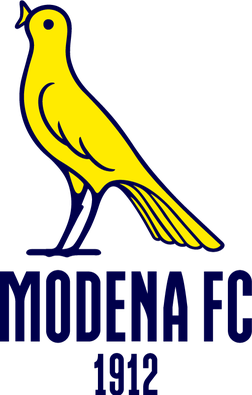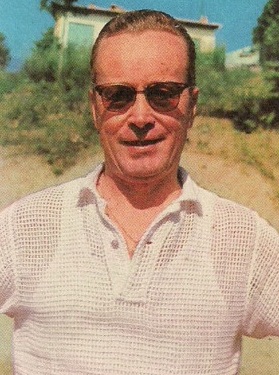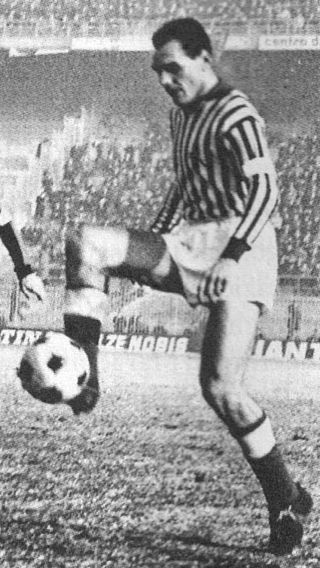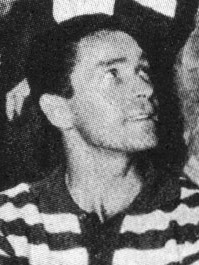Related Research Articles

Giuseppe Meazza was an Italian football manager and player. Throughout his career, he played mainly for Inter Milan in the 1930s, scoring 284 goals in 408 games for the club, and winning three Serie A titles, as well as the Coppa Italia; he later also played for two seasons for local rivals Milan, as well as Turin rivals Juventus for one season, in addition to his spells with Varese and Atalanta. At the international level, he led Italy to win two consecutive World Cups: in 1934 on home soil, and in 1938 as captain, being named to the All-star Team. Widely regarded as one of the best players of the 20th century, and one of the greatest Italian strikers in the history of the sport.

Giampiero Boniperti was an Italian footballer who played his entire 15-season career at Juventus between 1946 and 1961, winning five Serie A titles and two Coppa Italia titles. He also played for the Italy national team at international level and took part in the 1950 and 1954 FIFA World Cup finals, as well as the 1952 Summer Olympics with Italy. After retirement from professional football, Boniperti was a CEO and chairman of Juventus and, later, a deputy to the European Parliament.

Modena Football Club 2018, commonly referred to as Modena, is an Italian football club based in Modena, Emilia-Romagna. The club was founded in 1912, and refounded in 2018, having spent the majority of its existence playing in Serie B. They play in Serie B, having won 2021–22 Serie C's Group B title.

Roberto Bettega is an Italian former footballer who played as a forward.

Roberto Boninsegna is an Italian former professional footballer who mainly played as a forward. After retiring, he worked as a football manager. As a player, he played for the Italy national side at two World Cups, reaching the final in 1970.

Annibale Frossi was an Italian football manager and player, who played as a forward.

Alfredo Foni was an Italian footballer in the 1930s and later on a coach, who played as a defender. He is one of only four players to have won both an Olympic gold medal and the FIFA World Cup with the Italy national football team.
Matteo Momentè is an Italian footballer who plays for Cjarlins Muzane.

Aldo Serena is an Italian former professional footballer, who was usually deployed as a forward. He played for several Italian clubs throughout his career, winning four Serie A titles, among other trophies; he is mainly remembered for his time with Inter, where he won several trophies, including a league title and the UEFA Cup. At international level, he played for the Italy national team in the 1986 FIFA World Cup and the 1990 FIFA World Cup, helping the team to a third-place finish in the latter tournament.

Pietro Anastasi, nicknamed Petruzzu 'u turcu by fans, was an Italian footballer who played mainly in the role of a forward.

Amedeo Amadei was a professional Italian football player and manager, who played as a striker. Following his death in 2013, he was one of eleven members to be inducted into the A.S. Roma Hall of Fame. A fast and powerful forward, with a good touch, he is considered to be one of the best Italian strikers of all time. Amadei was known for his ability to run forward with the ball from midfield and find spaces in the opposing defence, as well as his prolific goalscoring, acrobatic ability in the air, and precise volleying, which allowed him to excel in the centre-forward role; due to his importance to Roma throughout his career, he was affectionately known by the fans as the "eighth King of Rome".

Felice Placido Borel was an Italian football player who played as a striker. He was a member of the Italy national football team that won the 1934 FIFA World Cup.

Paolo Pulici is an Italian football manager and former footballer who played as a striker. With 172 goals in all competitions, he is the all-time record goalscorer for Torino.

Luís Vinícius de Menezes, more famously known as Vinício is a former professional football player, who played as a centre forward. Although he is a Brazilian, Vinício played his entire career in Italy, and because of this, he was excluded from the Brazil national side, in a similar manner to José Altafini; unlike Altafini, however, Vinício chose not to play for the Italy national side. Following his professional footballing career, he later became a manager, who became known for introducing tactics based on Dutch total football in Italy.

Gino Pivatelli is a former Italian footballer and manager who played as a striker. An agile and technically gifted centre-forward, with a powerful right-footed shot, although he was a prolific goalscorer, he was also a highly versatile player, who was capable of playing in a creative role as a second striker or attacking midfielder, in deeper midfield positions, or as a defender, in addition to his usual position of forward.

Dino da Costa was a Brazilian-Italian professional footballer, who played as a central midfielder or striker.

Alberto Orlando is an Italian former footballer who played at both professional and international levels as a forward. Although not gifted with the best technical ability, he was a fast, physical, energetic, opportunistic, and powerful player, who was good in the air; he often played on the wing or through the centre of the pitch.

Giampaolo Menichelli is a former Italian footballer, who played as a winger. Menichelli was a fast, agile winger, with good technical ability, and he was known for mainly being a team player, despite also having an eye for goal. His brother Franco was an Olympic champion in gymnastics.
During the 1980–81 season Milan Associazione Calcio competed in Coppa Italia and for the first time ever in Serie B.
References
- 1 2 "BRIGHENTI, Sergio" (in Italian). Treccani: Enciclopedia dello Sport (2002). Retrieved 29 December 2014.
- 1 2 3 4 5 6 "Brighenti, il giro del calcio in 80 anni "Ho avuto tutto e non è finita qui"" (in Italian). Il Corriere della Sera. 23 September 2012. Retrieved 29 December 2014.
- ↑ "La nascita del calcio a Modena" (in Italian). Modenafc.net. Archived from the original on 24 May 2011. Retrieved 6 April 2020.
- ↑ È morto Sergio Brighenti, ex Inter e Samp. Fu il primo azzurro a segnare a Wembley (in Italian)
